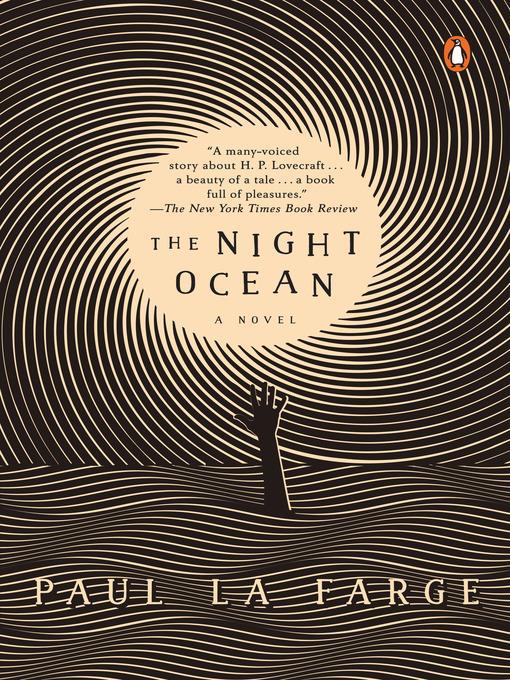
The Night Ocean
A Novel
کتاب های مرتبط
- اطلاعات
- نقد و بررسی
- دیدگاه کاربران
نقد و بررسی

Starred review from December 12, 2016
Reviewed by Peter Cannon
Was H.P. Lovecraft, the great American horror writer, gay? That’s the question at the start of this ingenious, provocative work of alternative history from La Farge (Luminous Airplanes). All the evidence, including Lovecraft’s voluminous correspondence and the firsthand accounts of those who knew him (notably the woman to whom he was briefly married), indicates that he was not. In his letters, he called homosexuality a perversion, but then he dismissed human sexuality in general as a lower form of animal activity.
But what if this was all a pose? Lovecraft, who lived most of his life in Providence, R.I., did spend the summer of 1934 visiting a teenage fan, Robert Barlow, at the Barlow family home in central Florida. Barlow, who would later become a professor of Mexican ethnography, committed suicide in Mexico City in 1951 to escape blackmailers who were threatening to expose him as a homosexual.
In the present day of this novel, New York freelance writer Charlie Willett, an avid Lovecraft fan, manages to locate a copy of the Erotonomicon (a play on Lovecraft’s fictional Necronomicon), which purports to be the erotic diary Lovecraft kept during his time in Florida. Coded prose using names from Lovecraft’s invented mythology records his sexual exploits (“did Yogge-Sothothe in my room”). While retracing Lovecraft’s steps in Florida, Charlie learns that Barlow may have faked his death and could still be alive. In the end, Charlie secures a substantial advance for a book about Lovecraft as a closet homosexual. Unfortunately for Charlie, he gets some critical facts wrong. He becomes a pariah and later disappears from a psychiatric hospital in the Berkshires, which is where the book’s action begins.
Lovecraft’s novel The Case of Charles Dexter Ward likewise opens with the disappearance of a major character from a psychiatric hospital, a connection made explicit by La Farge naming the first five section titles after those in Ward (“A Result and a Prologue,” etc.). The whole novel is framed as the account of the efforts of Charlie’s devoted therapist wife to find her husband. Like Lovecraft’s “The Call of Cthulhu,” the novel consists of several sub-narratives, ranging widely in time and place. But instead of a revelation about humanity’s diminished place in an impersonal universe, La Farge delivers insights into the human need to believe in stories and the nature of literary fame, while consistently upsetting readers’ expectations.
Other notable recent Lovecraft-related fiction includes Victor LaValle’s The Ballad of Black Tom, a redo of Lovecraft’s racist tale “The Horror at Red Hook,” and Matt Ruff’s Lovecraft Country, in which a black family contends with racism and supernatural forces in 1950s America. La Farge also touches on racial themes (Charlie’s father is black, his mother white), but he outdoes his predecessors with this crafty mix of love, sex, and lies. (Mar.)
Peter Cannon is a PW senior reviews editor and the author of The Lovecraft Chronicles, a novel.

Starred review from December 15, 2016
A many-layered literary mystery about identity, obsession, and science fiction. Marina Willett's husband, Charlie, is gone. After a scandal involving a book he's written, Charlie leaves a mental hospital in the Berkshires and--presumably--walks into a lake to drown himself. But Marina, a psychologist, isn't sure he's really dead. For one thing, his body has never been discovered. For another, before his death, Charlie had become obsessed with an anthropologist named Robert Barlow--who Charlie believes faked his death after a scandal. And so begins the labyrinthine plot in which Marina narrates the back story of her marriage and explains how first Charlie and then she, once Charlie goes missing, became obsessed with an elderly Canadian who may or may not be Barlow in disguise. The analytical Marina is the ideal narrator to ground readers through the vertiginous narrative, which covers nearly 100 years and uses New York, Florida, Providence, and Canada as its backdrops. The breadth of La Farge's research and the specificity of his historical details are impressive: we enter the worlds of science-fiction fandom, internet trolls, literary hoaxes, and ancient Mexican civilizations as La Farge (Luminous Airplanes, 2011, etc.) deftly weaves in famous figures like H.P Lovecraft, Isaac Asimov, and William S. Burroughs. Only a virtuoso could pull off a story so intricately plotted and so full of big ideas about morality and truth and have the effect of not being ponderous. La Farge is this virtuoso, folding stories inside stories with ease. But even more important than the meticulous craft evident in each sentence is the depth that La Farge achieves in creating even minor characters. No matter how messy the moral choices, or how frustrating the character motivations, La Farge's gift is such that we feel we understand these characters as well as we understand the people we see every day. An effortlessly memorable novel.
COPYRIGHT(2016) Kirkus Reviews, ALL RIGHTS RESERVED.

October 1, 2016
After her H.P. Lovecraft-obsessed husband vanishes, psychiatrist Marina Willett refuses to believe that he committed suicide and follows his fading trail. During her journey, we learn a lot about Lovecraft; gay teenage fan Robert Barlow, with whose family Lovecraft stayed for two months in 1934; future Beat writer William S. Burroughs, whom Lovecraft taught; and L.C. Spinks, a Canadian appliance salesman and sf enthusiast. From a former NYPL Cullman Fellow and Bard Fiction Prize winner.
Copyright 2016 Library Journal, LLC Used with permission.

























دیدگاه کاربران